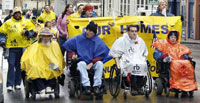‘Free our brothers and sisters’
Disabled protesters besiege Tennessee state capitol
By
Lou Paulsen
Published Apr 1, 2006 12:52 AM
More than 400 disabled activists from 40 states
and the District of Columbia recently staged five days of militant action in
Nashville, the capital of Tennessee and a national headquarters of for-profit
health care. Mobilized by Amer ican Disabled for Attendant Pro grams Today
(ADAPT), they demanded an end to policies that force elderly and disabled people
to go into nursing homes for services that they should be receiving in their own
homes.
|
‘Our homes, not nursing homes.’
Photo: Tom Olin, ADAPT
|
On March 19, in front of media and fed eral officials, over 100
present and former residents of Tennessee nursing homes testified to the
miserable and oppressive conditions they faced. “I swear to god it was
like listening to people who just got out of prison,” recalled Chicago
ADAPT organizer Ed Hoffmans. Being institutionalized in Tennessee is so bad, and
services outside nursing homes are so impossible to get, that activists have had
to create strategies to help disabled people escape to other states—a
system they call the Under ground Railroad.
The next day, hundreds of
protesters, many using wheelchairs, marched uphill in cold and wet weather to a
rally at the War Memorial. They then blockaded several intersections around the
Capitol building for over five hours, while also shutting down the exit from the
parking garage. They chanted, “Just like a nursing home—you
can’t get out!” Sixty were arrested.
On March 21 they returned
to the Capitol, rallying across the street and chanting steadily for two and a
half hours. A delegation attempted to meet with Gov. Phil Bre desen. After being
rebuffed, they blockaded Charlotte Avenue. Police arrested 44 and threatened
them with a month in jail and a $1,000 fine if they repeated their civil
disobedience action.
On the following day they held a long march through
the city to the office of TennCare, the state Medicaid program, and then to the
office of the U.S. Department of Housing and Urban Development. They chanted,
“Free our brothers, free our sisters, free our people
now!”
Bredesen, a Democrat, consistently refuses to meet with
disability activists. He is not a servant of the ruling class—he is a
member of it. He made his $100 million fortune in the health care industry,
specifically the managed-care giants HealthAmerica and Coventry.
Tennessee’s Repub lican senator, majority leader Bill Frist, likewise made
his fortune from the Tennessee-based Hospital Corporation of America.
Bredesen is a great believer in corporate medicine but not public health
care. In February 2005, he told a national conference that Medicaid has
“more in common with ... socialist economy than the commonsense business
principles that do such a good job allocating resour ces efficiently in other
parts of our American life.”
Acting on these principles, he
“solved” the budget problems of TennCare by throwing 330,000 poor
and uninsurable people off the rolls. In response, activists occupied
Bredesen’s outer office from June 20 to Sept. 4, 2005. This 77-day sit-in
is believed to be the longest ever at a U.S. State Capitol
building.
According to ADAPT sources, 77 percent of all Medi caid funds in
the U.S. are earmarked for nursing home care, meaning they mostly go to private
businesses, leaving less than a quarter for home-based services. But in
Tennessee the figure is 99 percent.
Contrary to the myth about capitalist
“efficiency,” home-based services would not only liberate the
recipients but cost less per person. But they would mean less profit for the
corporations, which view nursing homes as a gold mine, given the growing number
of people who need assistive care due to disability or age.
Protesters
called for the Tennessee legislature to pass the Community Choices Act, which
would allow Medicaid funds to be paid to community providers of the
recipient’s choice.
More information, including photos and video
clips, is available at www.adapt.org/freeourpeople/aar/nash06/.
Articles copyright 1995-2012 Workers World.
Verbatim copying and distribution of this entire article is permitted in any medium without royalty provided this notice is preserved.
Workers World, 55 W. 17 St., NY, NY 10011
Email:
[email protected]
Subscribe
[email protected]
Support independent news
DONATE


